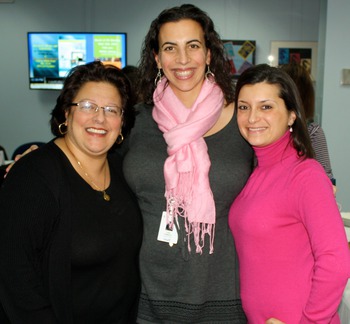 Rye Neck High School students are broadening their horizons by learning to communicate effectively in other languages. According to High/Middle School Spanish and Italian teacher Lina Cannavo, students taking advanced level language courses reap future rewards.
Rye Neck High School students are broadening their horizons by learning to communicate effectively in other languages. According to High/Middle School Spanish and Italian teacher Lina Cannavo, students taking advanced level language courses reap future rewards.

By Janice Llanes Fabry
Rye Neck High School students are broadening their horizons by learning to communicate effectively in other languages. According to High/Middle School Spanish and Italian teacher Lina Cannavo, students taking advanced level language courses reap future rewards.
Cannavo observed, “Pursuing a Language Other Than English (L.O.T.E.) in higher education gives students a competitive edge in the global market. It’s an effective way to get one up on the applicant pool,” she explained. It also opens up opportunities to leading translation services companies which you can view here to know about the scope of a good translator.
Rye Neck’s Level 4 language courses are linked to Manhattan College, where students can acquire three college credits, and AP students can earn up to six credits. This semester, Level 4 Spanish students are studying Spanish-speaking countries and regions. Italian students are rewriting their own version of “Cinderella” and performing it in the romance language.
Advance Placement students are working on a Hispanic immigration project and interviewing Hispanic households on the issue of immigration reform. They will be conducting a mock congressional debate in Spanish as well.
To bolster their efforts even further, Cannavo, with the help of the AP students, held a L.O.T.E. Exchange last month with a panel of professors from surrounding colleges and universities. In the school district’s community room, Rye Neck students were able to interact with Spanish, Italian, French, and Latin professors from Fordham University, and Iona, Queens, and Manhattanville colleges.
“Our goal is to enrich students’ academic and professional foundation for their 21st-century futures,” said Cannavo, herself a product of the Rye Neck School District. “The academic forum was a great opportunity for our students to connect with future educators, listen to their expectations, and gain essential information with regards to pursuing language.”
Cannavo noted that the college faculty members discussed professions that draw bilingual applicants, from careers in teaching and international business to medicine and the law. “To be able to speak to a larger clientele makes one more marketable and is becoming more necessary,” she said.
As far as the successful inaugural Exchange, Cannavo said, “We’d like to make it an annual event. The professors were highly impressed by our students. It’s remarkable so many of them go above and beyond the requirements.”















